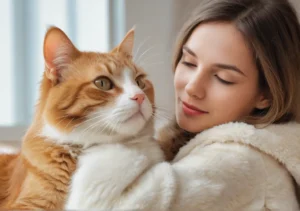Cats are often known for their independent and aloof nature, but have you ever noticed that they seem to become more loving at night? The mysterious behavior of cats, especially during those late hours, can leave many cat owners wondering what’s behind this change in demeanor.
The Science Behind Cats’ Nocturnal Behavior
Cats are crepuscular animals, meaning they are most active during dawn and dusk. This behavior stems from their ancestors who hunted during these times to avoid competition with larger predators. As a result, your feline friend may exhibit more affection and playfulness during the nighttime hours.
One key factor behind this behavior is cats’ exceptional night vision. Their eyes contain a high number of rod cells, which are specialized for low-light conditions. This heightened visual acuity allows them to navigate their surroundings with ease and engage in activities like hunting or exploring.
Additionally, cats have a higher body temperature than humans, which peaks in the evening. This increase in body heat can make them more energetic and eager for interaction during the night. So, when your cat curls up on your lap or rubs against your legs after the sun sets, it’s their way of seeking warmth and connection.
Factors That Influence Nighttime Affection
A cat’s environment plays a crucial role in determining their behavior at night. Providing a stimulating environment with toys, scratching posts, and cozy spots to rest can keep your cat entertained and prevent boredom-induced nighttime mischief. Additionally, establishing a consistent routine for feeding, playtime, and bedtime can help regulate your cat’s internal clock and reduce nighttime restlessness.
Moreover, individual personality traits can also influence a cat’s affection levels during the night. Some cats are naturally more social and cuddly, while others may prefer independent activities. Understanding your cat’s unique preferences and adjusting your interactions accordingly can foster a stronger bond and encourage nighttime companionship.
To encourage your cat’s affection during the night, consider engaging in interactive play sessions before bedtime, providing cozy sleeping spots in your bedroom, and offering calming scents like lavender or chamomile to create a soothing environment. Remember, every cat is different, so observe your furry companion’s behavior cues and adjust your approach accordingly for a purr-fect nighttime bonding experience.
The Bond Between Cats and Their Owners
Cats are known for their independent nature, but they can also form strong bonds with their owners. This connection is often built through daily interactions, feeding, grooming, and playtime. Cats are more likely to show affection towards their owners when they feel safe and secure in their presence. This bond can also influence their behavior at night, as they seek comfort and reassurance from their trusted human companions.
Mythbusting: Are Cats Really More Loving at Night?
Contrary to popular belief, cats are not necessarily more loving at night than during the day. Cats are crepuscular animals, meaning they are most active during dawn and dusk. This natural behavior may give the impression that they are more affectionate at night, but in reality, they are simply following their internal biological clock. It’s important to understand your cat’s individual preferences and needs, as each feline companion is unique in their behavior and interactions with their owners.
Top Tips for Understanding Your Cat’s Behavior:
- Pay attention to your cat’s body language: Cats communicate through their posture, tail movements, and vocalizations. Understanding these cues can help you decipher their feelings and needs.
- Provide a comfortable sleeping environment: Cats love cozy spots for rest, so make sure to create a warm and safe sleeping area for your feline friend.
- Establish a routine: Cats thrive on consistency, so try to establish a regular feeding and playtime schedule to keep them happy and content.
- Offer plenty of enrichment: Keep your cat mentally stimulated with toys, scratching posts, and interactive games to prevent boredom and unwanted behaviors.
Remember, cats may show affection in their own unique ways, so take the time to observe and understand your furry companion to strengthen your bond and create a harmonious relationship.
Why Cats Are More Loving at Night
Cats are known for their independent nature, but have you ever wondered why they seem to show more affection at night? One possible reason is that cats are crepuscular animals, meaning they are most active during the dawn and dusk hours. This natural behavior pattern may explain why your feline friend becomes more cuddly and loving when the sun goes down.
Another factor to consider is that nighttime offers a quieter environment, free from daytime distractions. With fewer noises and activities to compete for their attention, cats may feel more relaxed and comfortable, prompting them to seek out affection from their human companions.
Furthermore, cats are known for their heightened senses, particularly their exceptional night vision. This means that they may feel more confident and secure in the dark, allowing them to let their guard down and show their softer side.
Tips for Encouraging Affectionate Behavior
- Quality Time: Spend dedicated one-on-one time with your cat, engaging in interactive play or simply enjoying some quiet cuddles.
- Gentle Touch: Pet your cat in their favorite spots, such as behind the ears or under the chin, to help them relax and bond with you.
- Positive Reinforcement: Reward your cat with treats or praise when they display affectionate behavior to encourage more of the same.
Nighttime Activities for Cats
When the moon is high in the sky and your cat is raring to go, it’s essential to provide them with engaging and entertaining activities to keep them happy and stimulated during the nighttime hours. Keep in mind that while you may be ready to hit the hay, your cat may be gearing up for playtime.
One way to channel your cat’s nighttime energy is to provide them with interactive toys that mimic the thrill of hunting. Toys that move unpredictably or simulate prey can keep your cat engaged and mentally stimulated well into the night.
To promote restful sleep for both you and your feline friend, consider incorporating calming activities into your nighttime routine. Gentle brushing, soothing music, or a cozy spot near you can help your cat wind down and prepare for a restful night’s sleep. Remember, a tired and content cat is more likely to show love and affection when the sun goes down.
The Importance of Sleep for Cats
Cats are notorious for their love of napping, and there’s a good reason for that. Sleep is crucial for their overall well-being. Just like humans, cats need quality rest to function at their best. Without enough sleep, they can become irritable, restless, and even more demanding of attention. So, when your feline friend seems extra loving at night, it could be because they’ve had a good snooze during the day and are ready to play and cuddle.
Fun Facts About Cats and Nighttime Behavior
Did you know that cats are crepuscular animals? This means they are most active during dawn and dusk, explaining why they seem to come alive at night. Their ancestors were nocturnal hunters, so these tendencies have been passed down through generations. Cats also have a heightened sense of hearing and sight in low light, making the cover of darkness the perfect time for them to explore and engage in all sorts of antics. So, when your cat is being extra affectionate in the wee hours, it’s their natural instinct kicking in.
Additional Unique Insight:
– Cats are known to be more social at night because they feel safer and more secure under the cover of darkness. This allows them to let their guard down and seek comfort and interaction with their favorite humans.
Remember, every cat is unique, so their nighttime behavior can vary. By understanding the importance of sleep for cats and the fascinating facts behind their nighttime antics, you can better appreciate and enjoy those late-night cuddle sessions with your furry friend.
Alex, a passionate animal lover, has experience in training and understanding animal behavior. As a proud pet parent to two dogs and three cats, he founded AnimalReport.net to share insights from animal experts and expand his knowledge of the animal kingdom.




